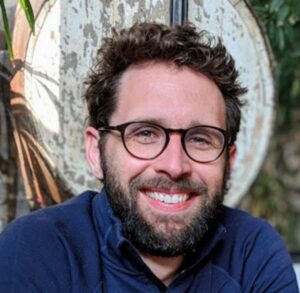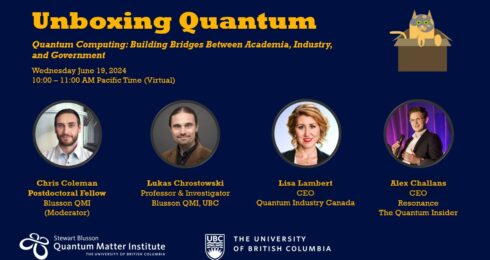Andrew (Drew) Potter will join the Department of Physics and Astronomy at UBC as an Assistant Professor and the Stewart Blusson Quantum Matter Institute (Blusson QMI) as a Principal Investigator in August. He will establish his research program at Blusson QMI, moving from the University of Texas in Austin. Potter, a theorist, is currently recruiting graduate students to work in his group.

Pictured: Assistant Professor Andrew Potter.
Potter, who completed his PhD at the Massachusetts Institute of Technology and a Gordon and Betty Moore Foundation postdoctoral fellowship at the University of California (Berkeley), is eager to join the team at Blusson QMI, looking forward in particular to the potential for collaboration with Blusson QMI investigators.
“On the fundamental science side, I am interested in questions like what types of phases of matter are possible with nature, and trying to come up with mathematical frameworks to understand new phases of matter,” said Potter. “I’m also interested in how to change the properties of a given material, or create artificial materials.”
Potter’s work spans several research areas, and his work has implications across a range of projects, including Blusson QMI’s Grand Challenges.
“One of the big questions for us is: if you are able to control matter in a time dependent way, can you create phenomena that are stable like a phase of matter, but which have properties that would be forbidden in thermodynamic equilibrium?”
To answer these questions, Potter is looking the power of quantum computing to understand materials.
“Even if you know the structure of the material and try to predict how it’s going to behave when you pass current through it or shine light on it, it’s a really challenging computational problem, and not one a conventional computer can solve,” said Potter. “Quantum computers behave a like the materials we are trying to simulate, but the quantum computers that we have now are very small scale and error prone.”
To solve the problem, Potter has been working to leverage what researchers currently know about materials and create simulation algorithms that will be able to solve problems on these smaller scale quantum computers. He looks forward to engaging more directly with the quantum computing researchers and Pushing the boundaries of Noisy Intermediate Scale Quantum (NISQ) computing by Focusing on Quantum Materials Problems, the Blusson QMI quantum computing Grand Challenge.
While the science and the research community at the University of British Columbia and Blusson QMI are compelling, Potter is also looking forward to the opportunities to experience Vancouver. As an avid cyclist and climber, he is eager to get outside and explore and navigate a different climate and culture than he has grown used to in Texas.
“I’m really excited to be part of this network of researchers, and I appreciate that Blusson QMI really has a full stack of people, from theorists to people who grow materials through to experimentalists measuring their properties, it seems like they all work very closely together,” said Potter. “I think it will be beneficial—but also fun—to have that kind of tight knit experimental community to work with.”
Learn more about Andrew Potter and his research:
- Website: Theory of Quantum Matter, Information & Dynamics
- Selected publications:
- Zhang, J., Hess, P., Kyprianidis, A. et al. Observation of a discrete time crystal. Nature 543, 217–220 (2017). https://doi.org/10.1038/nature21413
- Potter, A.C., Morimoto, T., and Vishwanath, A. Classification of Interacting Topological Floquet Phases in One Dimension. Phys. Rev. X 6, 041001 (2016). https://doi.org/10.1103/PhysRevX.6.041001
- Potter, A.C., Vasseur, R., and Parameswaran, S. A. Universal Properties of Many-Body Delocalization Transitions. Phys. Rev. X 5, 031033 (2015). https://doi.org/10.1103/PhysRevX.5.031033
- Foss-Feig, M., Hayes, D., Dreiling, J.M., Figgatt, C., Gaebler, J.P., Moses, S.A., Pino, J.M., and Potter, A.C. Holographic quantum algorithms for simulating correlated spin systems. Phys. Rev. Research 3, 033002 (2021). https://doi.org/10.1103/PhysRevResearch.3.033002
- Moll, P., Nair, N., Helm, T. et al. Transport evidence for Fermi-arc-mediated chirality transfer in the Dirac semimetal Cd3As2. Nature 535, 266–270 (2016). https://doi.org/10.1038/nature18276


